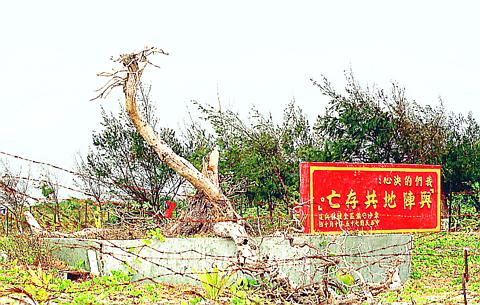Plans by Taiwan to replace the military presence on the Pratas (東沙) and Spratly (南沙) islands in the South China Sea with a civilian force is not strategically justifiable, military analysts say. This is despite claims that this force could be effective for the handling of fishing disputes with China or pirate attacks in the region.
"Unless the government has decided to abandon the two islands, which are a long away from Taiwan proper, it should not confuse their strategic value with their tactical uses," said military analyst Su Chin-chiang (
"Replacing troops with a police force is equal to downgrading the strategic value of the two islands. It should not happen," Su said. "The armed forces' job is to defend the country's territory, while the police's job is to maintain social order. It is the same in most other countries."

PHOTO: CHANG CHUNG-YI
The troop withdrawal plan is to coincide with the establishment next year of the new Coast Guard Administration, which will bring together elements of police, customs and military forces that currently protect Taiwan's shores.
Su also pointed out that police are not properly trained to defend a country's territory in case of attack and would be unable to make effective use of weapons and equipment for this purpose.
"It seems that the government plans to leave the defense of these two islands to a police force only because it thinks the armed forces cannot hold them against an invasion."
The government could have handled the matter better, Su said, if they sent both troops and police to carry out their respective functions on the islands.
Lin Yu-fang (
"The plan is confusing and illogical. If the armed forces cannot defend the two islands against an invasion, the police will be even less capable of doing so," Lin said.
"If there is any meaning behind the move, it could be only that the government wants to abandon less important territories like the Pratas and Spratlys, so that it can focus its troops on defending Taiwan proper, as well as the Penghu, Matsu and Kinmen islands, in an attack by China," he said. "This is not a smart move since China will not attack the two islands if its aim is Taiwan."
"It is true that Taiwan's air force and navy do not have the ability to project their power into the South China Sea. But China does not have that ability either," Lin said. A better way to avoid a confrontation with the Chinese troops, he said, would be not to pull troops out of frontline posts but to take the initiative in peace talks.
KMT lawmaker Chen Ching-po (
"The troops on Kinmen and surrounding islets now number less than 10,000 -- a great reduction from 50,000-some at their peak," Chen said.
Minister of National Defense Tang Fei (
"The armed forces do not have the capability to defend the two islands, since they are beyond the range that the air force and navy can efficiently operate," Tang said.
"If we use a lot of energy and resources on defending the two islands, the safety of Taiwan proper and other major territories will be put at greater risk," he said.

A magnitude 7.0 earthquake struck off Yilan at 11:05pm yesterday, the Central Weather Administration (CWA) said. The epicenter was located at sea, about 32.3km east of Yilan County Hall, at a depth of 72.8km, CWA data showed There were no immediate reports of damage. The intensity of the quake, which gauges the actual effect of a seismic event, measured 4 in Yilan County area on Taiwan’s seven-tier intensity scale, the data showed. It measured 4 in other parts of eastern, northern and central Taiwan as well as Tainan, and 3 in Kaohsiung and Pingtung County, and 2 in Lienchiang and Penghu counties and 1

FOREIGN INTERFERENCE: Beijing would likely intensify public opinion warfare in next year’s local elections to prevent Lai from getting re-elected, the ‘Yomiuri Shimbun’ said Internal documents from a Chinese artificial intelligence (AI) company indicated that China has been using the technology to intervene in foreign elections, including propaganda targeting Taiwan’s local elections next year and presidential elections in 2028, a Japanese newspaper reported yesterday. The Institute of National Security of Vanderbilt University obtained nearly 400 pages of documents from GoLaxy, a company with ties to the Chinese government, and found evidence that it had apparently deployed sophisticated, AI-driven propaganda campaigns in Hong Kong and Taiwan to shape public opinion, the Yomiuri Shimbun reported. GoLaxy provides insights, situation analysis and public opinion-shaping technology by conducting network surveillance

Taiwan is gearing up to celebrate the New Year at events across the country, headlined by the annual countdown and Taipei 101 fireworks display at midnight. Many of the events are to be livesteamed online. See below for lineups and links: Taipei Taipei’s New Year’s Party 2026 is to begin at 7pm and run until 1am, with the theme “Sailing to the Future.” South Korean girl group KARA is headlining the concert at Taipei City Hall Plaza, with additional performances by Amber An (安心亞), Nick Chou (周湯豪), hip-hop trio Nine One One (玖壹壹), Bii (畢書盡), girl group Genblue (幻藍小熊) and more. The festivities are to

AFTERMATH: The Taipei City Government said it received 39 minor incident reports including gas leaks, water leaks and outages, and a damaged traffic signal A magnitude 7.0 earthquake struck off Taiwan’s northeastern coast late on Saturday, producing only two major aftershocks as of yesterday noon, the Central Weather Administration (CWA) said. The limited aftershocks contrast with last year’s major earthquake in Hualien County, as Saturday’s earthquake occurred at a greater depth in a subduction zone. Saturday’s earthquake struck at 11:05pm, with its hypocenter about 32.3km east of Yilan County Hall, at a depth of 72.8km. Shaking was felt in 17 administrative regions north of Tainan and in eastern Taiwan, reaching intensity level 4 on Taiwan’s seven-tier seismic scale, the CWA said. In Hualien, the